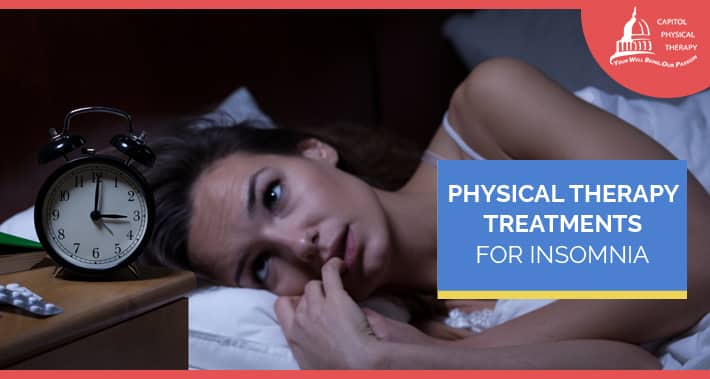
Have you had trouble with falling asleep or staying asleep?
Are those restless nights affecting you throughout the day, and causing you fatigue that is difficult to deal with?
These sleep issues may be impacting your functioning, as sleep is a vital part of both your physical and mental health.
Sleep helps you with many aspects of your functioning, including: cell growth, energy, alertness, cognition, and mood.
Without sleep, you would deal with negative impacts to various aspects of your functioning.
So, if you’re dealing with sleep issues, you will probably notice the effects in every area of your life.
These sleep issues can wreck havoc on your health and increase your risk of health issues.
If you can relate to the issues with falling asleep or staying asleep or you feel tired during the day on a constant basis, you might have insomnia.
Insomnia can be short term (acute) or long term (chronic).
Most individuals can experience what is referred to as acute insomnia.
The long-term insomnia however has especially tough side effects that you shouldn’t have to live with.
Thankfully, there is hope if you are dealing with the impacts of insomnia on your everyday life.
Did you know that a physical therapist can help you manage your insomnia?
If you’re interested, our physical therapy clinic can help.
For more information about how physical therapy could help treat your insomnia, read on.
What Is Insomnia?
The average adult requires about 7-9 hours of sleep a night.
However, the average sleep required may vary from person to person depending on your age, gender, and other demographic factors.
If you’re one of 10-30% of adults around the world who have reported having trouble sleeping at night, you may have insomnia.
Insomnia is one of the many types of sleep disorders, along with obstructive sleep apnea.
Insomnia is a common sleep disorder that can leave you feeling dissatisfied with the sleep you’ve been getting.
Insomnia can mean that you have trouble getting to sleep, staying asleep, or feeling rested when you awaken in the morning.
It can also mean having trouble with sleeping in as long as you’d like the next morning.
Insomnia can occur in the short-term or in the long-term.
For the short-term type, think of those sleepless nights before a big exam or an interview.
The acute type is usually due to stress, and it doesn’t last very long.
When insomnia occurs for a longer period though, it can become chronic.
Insomnia can come and go as well, meaning it can be episodic, with periods where a person may sleep fine.
The chronic kind of insomnia occurs for various days of the week, and for months.
If you have trouble sleeping for the usual 7-9 hours, and this happens more than just an occasional poor night of sleep, it might be insomnia.
You may have some or all of the following symptoms if you deal with insomnia
- Restlessness
- An increased risk of chronic fatigue syndrome
- Difficulty with concentration
- Lack of energy
- Mental health conditions
- Excessive daytime sleepiness
- Other widespread health effects
- Decreased performance (at work or in school especially)
- A higher risk of automobile accidents
- Lower back pain
- Headaches
Chronic pain has also been seen to accompany insomnia.
If you have trouble sleeping for a single night, this may not be an issue but if you have trouble sleeping for multiple months on end, then it may be time to seek help.
A physical therapist may be able to help to provide treatment for your insomnia and its accompanying symptoms.
As previous mentioned the types of insomnia differ for various reasons, one of them being the duration of the insomnia.
There are two types of insomnia that you may have.
Short Term Insomnia
With short term insomnia, also known as transient insomnia or acute insomnia, symptoms will typically lasts only a few days or a week.
There are different reasons for insomnia but this type of insomnia is usually related to increased stress in your daily life.
This could be due to job loss or other daily life stressors that may increase the risk of sleep issues.
Whether related to a life stressor or something disrupting your usual routine, short term insomnia will usually go away on its own once your life has settled again.
This type of insomnia can occur in anyone, because any human is capable of experiencing stress.
Chronic Insomnia
Chronic insomnia is the insomnia that is long-term, and can last for three months or more.
With chronic insomnia, you may have trouble falling or staying asleep for any length of time.
Chronic insomnia will have many effects on your daily life because of the constant exhaustion and other symptoms it can cause.
There are numerous health conditions that you may be at an increased risk for due to chronic insomnia.
These conditions include:
- High blood pressure
- Heart disease
- Diabetes
- Stroke
- Obesity
- Autoimmune diseases like rheumatoid arthritis
Decreased brain function and an increased risk of neurological conditions and other diseases can occur the longer you go without sleep.
Causes Of Insomnia
There are many causes of insomnia, and multiple causes can affect you at any one time.
Hyperarousal is one cause of insomnia.
Hyperarousal is when your body goes into high alert as if it is being threatened, and can be physical or mental.
Stress is a major cause of hyperarousal and insomnia.
If you’re feeling stressed by your current workload, life circumstances, or social relationships, this could be contributing to your insomnia.
Traumatic situations can also cause chronic stress, including post traumatic stress disorder (PTSD).
Once you start having trouble sleeping, trying to sleep may itself become a stressful event, making the insomnia even more difficult to overcome.
Unusual habits and schedules can also contribute to insomnia.
Using electronic devices late at night, napping too late in the day, late caffeine consumption, and using your bed for activities other than sleep, are all factors that could be contributing to your insomnia.
Along with the causes of insomnia, there are also numerous risk factors.
You are at an increased risk of insomnia if you are a women you are older than 60, or if you drink alcohol or caffeine often.
Insomnia is just one of many health conditions that can occur in old age and physical therapy can provide treatment for.

How Can A Physical Therapist Help With Insomnia?
Your physical therapist will likely also work on other conditions that can be a huge contributor to insomnia.
Physical therapy for chronic conditions can help, and can be different based on the type of condition being treated.
Your physical therapist may provide:
- Physical therapy for Alzheimer’s disease
- Physical therapy for Parkinson’s disease
- Physical therapy for fibromyalgia
- Physical therapy for myofascial pain syndrome
If you experience chronic pain or other limitations, a physical therapy for chronic pain may also help.
Your physical therapist will conduct an assessment to get a well rounded understanding of how your physical conditions, limitations, and body positions may contribute to your insomnia.
Your physical therapist will focus on body positioning and how to improve positions so your body doesn’t continue to go into a hyperarousal state.
They might also have recommendations for improving your routine.
For example, your physical therapist might work with you to make sure you are maintaining a regular sleep schedule.
They may work with you to determine how exercise may help to improve your symptoms of insomnia.
These exercises could include low intensity yoga or high intensity Pilates, which both have numerous health benefits, aside from helping with insomnia.
They may recommend that you have a specific routine you do every night before bed, and ask if your sleeping environment is best conducive to sleeping.
You may want to come up with a bed time routine that limits your use of electronics before bed and your caffeine intake.
The best sleeping environment should be dark, relaxing, and quiet.
You may go over some ways you can change your environment to make sure it fits with the best sleeping environment requirements of dark, relaxing, and quiet.
Your physical therapist will make sure your body and environment are both ready for a good night’s rest, so you can leave your insomnia in the past.
Book Your Appointment With Capitol Physical Therapy Today
If you’re interested in knowing more about how physical therapy can help your insomnia in the DC area, look no further.
You don’t have to go to bed every night wondering if you’ll be able to get to sleep.
Book your appointment with Capitol Physical Therapy today.
1331 H St NW #200,
Washington, DC 20005
- https://g.page/capitolptdc
9560 Pennsylvania Ave. # 202,
Upper Marlboro, MD 20772
- https://goo.gl/maps/zjL4NnnuThRhrcS86
Capitol Physical Therapy offers orthopedic and other pain related solutions, with our versitile team of physical therapists in Washington, DC